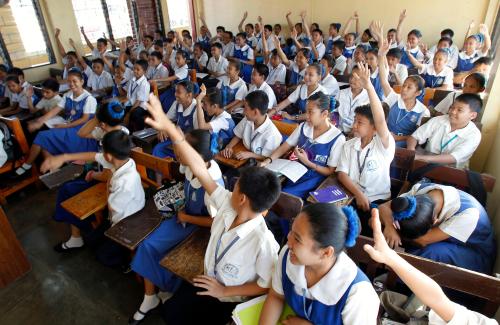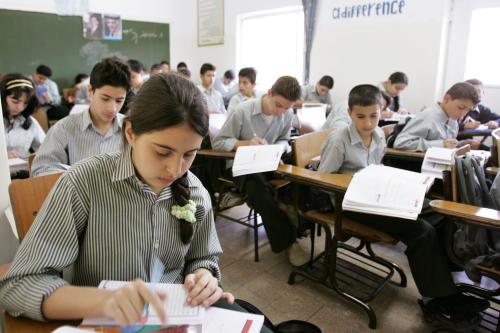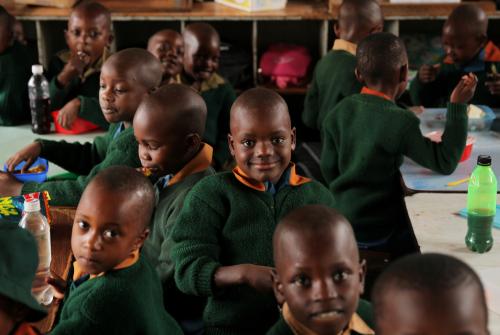For many of us, it has been a stunning experience to find ourselves adjusting our daily routines to take safety precautions to protect ourselves, loved ones, and neighbors.
In the midst of this global pandemic, we are reflecting in real-time on how systems undergo large-scale transformation—how government, businesses, schools, cities, and communities adapt and make fundamental changes to existing ways of working. This issue of systems change and, more specifically, how education initiatives scale and spread, is a topic that we at the Center for Universal Education (CUE) have been exploring in our Real-time Scaling Labs over the past year. These scaling labs—action research projects led by CUE and undertaken in partnership with local institutions across five countries—are an effort to learn how effective education practices scale across communities and countries. Through learning from, documenting, and supporting the process of expanding and deepening the impact of education initiatives around the world, the labs aim to develop concrete, practical guidance on key drivers that contribute to large-scale transformative change in education.
Prior to the spread of COVID-19, we had been reflecting with our partners on how difficult it is to change a system: Systems prefer the status quo and often require a crisis to transform. We are certainly watching this play out today—many countries have been slow to respond to the global pandemic despite significant data and advice from experts on what measures are needed—and have only leapt into action once the magnitude of the virus was apparent.
As the world grapples with responding to the current crisis, we are struck that some of the same key principles we have been studying in the Real-time Scaling Labs might also be relevant in responding to this pandemic. These include:
- Iterative, adaptive learning. Flexibility and adaptive capacity are crucial at a time when events unfold rapidly, and households, communities, and leaders must constantly adjust to a new reality on a day-by-day basis. The situation has also brought to the forefront a deeper appreciation of the importance of reliable, high-quality, timely data for decisionmaking, while acknowledging the limitations of existing data in representing the true scope of a rapidly shifting crisis. At the same time, we are witnessing firsthand what behavioral science has long shown—that data alone are not always enough to spur change as attitudes, beliefs, and behaviors are deeply ingrained in people and institutions.
- Engagement of multiple actors. This crisis has underscored the essential role of government in preparing for and responding to a crisis and ensuring that the basic needs of individuals, especially the most marginalized, are met. Now more than ever, the duty of government to provide social services, safety nets, and investments in global public goods is clear. At the same time, COVID-19 has also underscored that government is unable to address this crisis alone; managing a situation of this scope absolutely requires the collective efforts of actors across the system, bringing together non-usual suspects from the private sector, civil society, and community leadership to creatively collaborate. For example, to help millions of students continue to learn remotely while schools are closed due to COVID-19, China launched a national online learning platform for junior and senior high school students and broadcast primary school classes on public television. To make this digital solution work smoothly for millions of children at once, major telecommunications operators and technology companies collaborated with the government to back up servers and ensure sufficient bandwidth. And even before the platform was rolled out, Chinese tech companies had already been offering students free online courses.
- Knowledge sharing and peer-to-peer learning. If ever there was a time to learn from one another and avoid repeating mistakes, it is now. We often say we are a global community, but the crisis has made these words all the more real. In some ways, COVID-19 has leveled the playing field; wealthy countries are unable to insulate themselves from a virus that does not respect borders or discriminate based on socio-economic status, gender, race, or religion. High-income countries have much to learn from the experiences of lower-income countries that have previously coped with the realities of massive displacement and crises such as the devastating Ebola outbreaks. At the same time, while COVID-19 can affect anyone, we do know its impact absolutely will discriminate. Those who are already furthest behind or marginalized are most at risk of suffering from this crisis—economically, physically, mentally, and educationally. During the Ebola crisis in West Africa, we know it was often girls who suffered the most, with spikes in teen pregnancy, sexual violence, and increased need to support family members, and consequent school dropouts and stigmatization. And we are seeing this play out firsthand in the schools in our own communities. My [Jenny] children in Connecticut were all given Chromebooks to continue their education virtually, while children in neighboring towns risk going hungry or losing critical physical and mental health services in the wake of school closures.
- Innovation in education. One of the silver linings from this crisis may very well be reimagining what education can and should be in the 21st century. This may include the global community doubling down on investments to ensure continued educational opportunities in situations of instability and crisis, as well as further exploring distance learning possibilities. While technology will certainly play a role in reconsidering the possibilities for teaching and learning, especially in support of virtual learning opportunities, we also know that technology alone isn’t a panacea for future crises—and the risks of technology further exacerbating inequities must be addressed. The current situation provides an opportunity to think outside the box about how our education systems can best deliver quality learning opportunities for our children to survive and thrive in today’s rapidly changing and uncertain world.
The COVID-19 crisis is already having and will continue to have devastating consequences for individuals and communities across the globe, which must not be underestimated. At the same time, the crisis also provides a critical opportunity for us to learn more about the essential principles underpinning large-scale transformative change, as is needed in many education systems around the world. The hope is that we can come out on the other side of this pandemic with more evidence and lessons learned about how to expand the impact of effective social interventions and introduce new ways of working within our education systems to provide quality learning opportunities to all. In future posts, we will share stories from our scaling lab partners from around the world on how they are innovatively coping during this crisis to ensure that millions of children continue to receive an education.
The Brookings Institution is committed to quality, independence, and impact.
We are supported by a diverse array of funders. In line with our values and policies, each Brookings publication represents the sole views of its author(s).








Commentary
The COVID-19 crisis and reflections on systems transformation
March 26, 2020